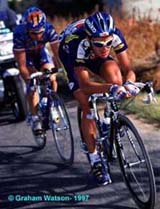|
|
Coca-Cola Preferred by Top Endurance
Cyclists |
|
|
|
|
Coca-Cola Preferred by Top Endurance
Cyclists |
|
|
|
An unsponsored survey
conducted at the 1997 US Professional Championship Road
Race showed that more than half of the cyclists drank
Coca-Cola, usually during the last half of the
race. |
 A thirst only Coke can satisfy? |
Assume you're a competitive road cyclist and you've been racing for more than four hours in hot conditions. Your carbohydrate stores are dwindling and your body water has dropped by more than four liters. With less than an hour of riding to go, you enter the feed zone one last time. As you look for every possible advantage, an important question dominates your thoughts: "What should I drink?"
In the sport of road cycling, competition typically occurs on successive days and generally lasts 2 to 6 hours. Competitions can be characterized as aerobically demanding with short high-intensity efforts that involve anaerobic energy systems. This type of activity depletes body water and muscle glycogen, so carbohydrate-electrolyte sport drinks are recommended. At the Australian Institute of Sport, athletes undergo nutritional counseling to ensure that they are aware of drinking strategies that are compatible with current scientific wisdom. But we have noted on many occasions that Aussie road cyclists, mountain cyclists, and cross-country skiers drink Coca-Cola during competition. The consumption of soft drinks, especially colas, was a common practice among athletes 20 years ago (VanHandel, et al., 1977), but you would think that top athletes would now be using the recommended sport drinks. We decided to do a survey during the US Professional Cycling Championships to find out what the best cyclists use.
Details of the Survey
A survey was constructed that would allow soigneurs of professional cycling teams to identify which drinks were consumed by their riders during the 1997 CoreStates US Professional Championship Road Race held in Philadelphia, Pennsylvania. During the race soigneurs were approached in the feed zone and asked whether they would be willing to fill out the questionnaire which was primarily designed to understand which sport drinks were being consumed by professional cyclists during the race. Soigneurs were told that the survey was not sponsored by a sport drink company. The questionnaire involved 12 questions and was generally completed within 5 minutes.
Representatives from 11 of 19 teams professional men's cycling teams completed this survey. Teams varied in number from 5-10 cyclists and most of the teams were composed of cyclists who were from the United States. Cyclists from the following countries were also included on teams that completed the survey: Australia, Belgium, Canada, Czech Republic, France, Great Britain, Germany, Italy, Netherlands, Russia, and Spain.
Most Professional Cyclists Prefer Coca-Cola
In six out of the 11 teams, all of the riders drank Coca-Cola during the race. More than 67% of the riders drank Coca-Cola in four of the teams and only one team was identified that did not drink Coca Cola during the race. Thus, roughly 90% of the teams surveyed consumed Coca-Cola. In all cases Coca-Cola was consumed during the last half to the last quarter of the race and was used as a supplement to some other type of carbohydrate electrolyte drink. In seven out of the 10 teams that used Coca-Cola, the drink was handed out to the riders "de-fizzed." In other words, the Coca-Cola was not fully carbonated at the time of consumption. Coca-Cola was consumed as a post-race drink in conjuction with some other type of carbohydrate electrolyte or protein drink in eight out of the 11 teams surveyed.
Why is Coca-Cola so Popular?
At the US Professional Cycling Championships, Coca-Cola was the preferred "sport drink" for the final stages of the race. Although conventional scientific wisdom might not support this practice, data from our survey documents that consumption of Coca-Cola by professional road cyclists remains pervasive. It is possible the taste, the availability and the caffeine content contribute to the popularity of this drink for endurance athletes. However, it should be noted that thus far researchers have not been able to document that the caffeine content (Perkins and Williams 1975) or that the carbonation associated with Coca-Cola (Zachwieja, et al. 1992) provides an ergogenic effect. Of particular concern is the relatively high carbohydrate content of most cola drinks which may decrease gastric emptying (VanHandel, et al. 1977).
Further research is required to see how much Coca-Cola is used as a sport drink by other top endurance athletes. But more important, any ergogenic effect of Coca-Cola remains to be established. Is it possible that the carbonated water, sugar, color, food acid, and flavors contained in the red and white can is truly superior to all the scientifically designed sport drinks that scientists recommend? Is this another example of athletes being ahead of scientists?
References
Perkins, R. and Williams, M. (1975). Effect of caffeine upon maximal muscular endurance of females. Medicine and Science in Sports, 7, 221-224.
VanHandel, P., et al. (1977). Physiological response to Cola ingestion. The Research Quarterly, 48(2), 436-444.
Zachwieja, J., et al. (1992). The effects of a carbonated carbohydrate drink on gastric emptying, gastrointestinal distress, and exercise performance. International Journal of Sport Nutrition, 2, 239-250.